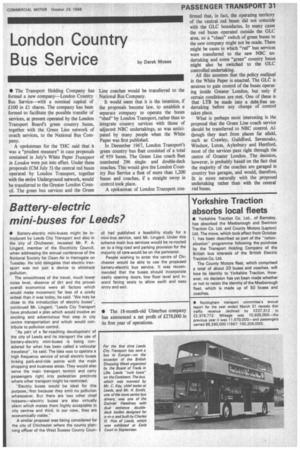Battery-electric mini-buses for Leeds?
Page 33

If you've noticed an error in this article please click here to report it so we can fix it.
• Battery-electric mini-buses might be introduced by Leeds City Transport and also in the city of Chichester, revealed Mr. P. A. Lingard, member of the Electricity Council, when addressing the annual conference of the National Society for Clean Air in Harrogate on Tuesday. He told delegates that electric transport was not just a device to eliminate pollution.
The smoothness of the travel, much lower noise level, absence of dirt and the proven overall economics were all factors which would make movement far less of a costly ordeal than it was today, he said. -We may be close to the introduction of electric buses" continued Mr. Lingard. "Leeds City Transport have produced a plan which would involve an exciting and adventurous first step in city centre transportation and which would contribute to pollution control.
"As part of a far-reaching development of the city of Leeds and its transport the use of battery-electric mini-buses is being considered for what has been called a vehicular travelator", he said. The idea was to operate a high frequency service of small electric buses linking park-and-ride points with the main shopping and business areas. They would also serve the main transport termini and carry passengers right into pedestrian precincts where other transport might be restricted.
"Electric buses would be ideal for this purpose, first because they emit no pollution whatsoever. But there are two other chief reasons—electric buses are also virtually silent which makes them highly acceptable in city centres and third, in our view, they are economically viable."
A similar proposal was being considered for the city of Chichester where the county planning officer of the West Sussex County Coun
cif had published a feasibility study for a mini-bus service, said Mr. Lingard. Under this scheme main bus services would be re-routed on to a ring road and parking provision for the majority of cars would be on the perimeter.
People wishing to enter the centre of Chichester would be able to use the proposed battery-electric bus service. It was recommended that the buses should incorporate easily opening doors, low floor level and inward facing seats to allow swift and easy entry and exit.
















































































































